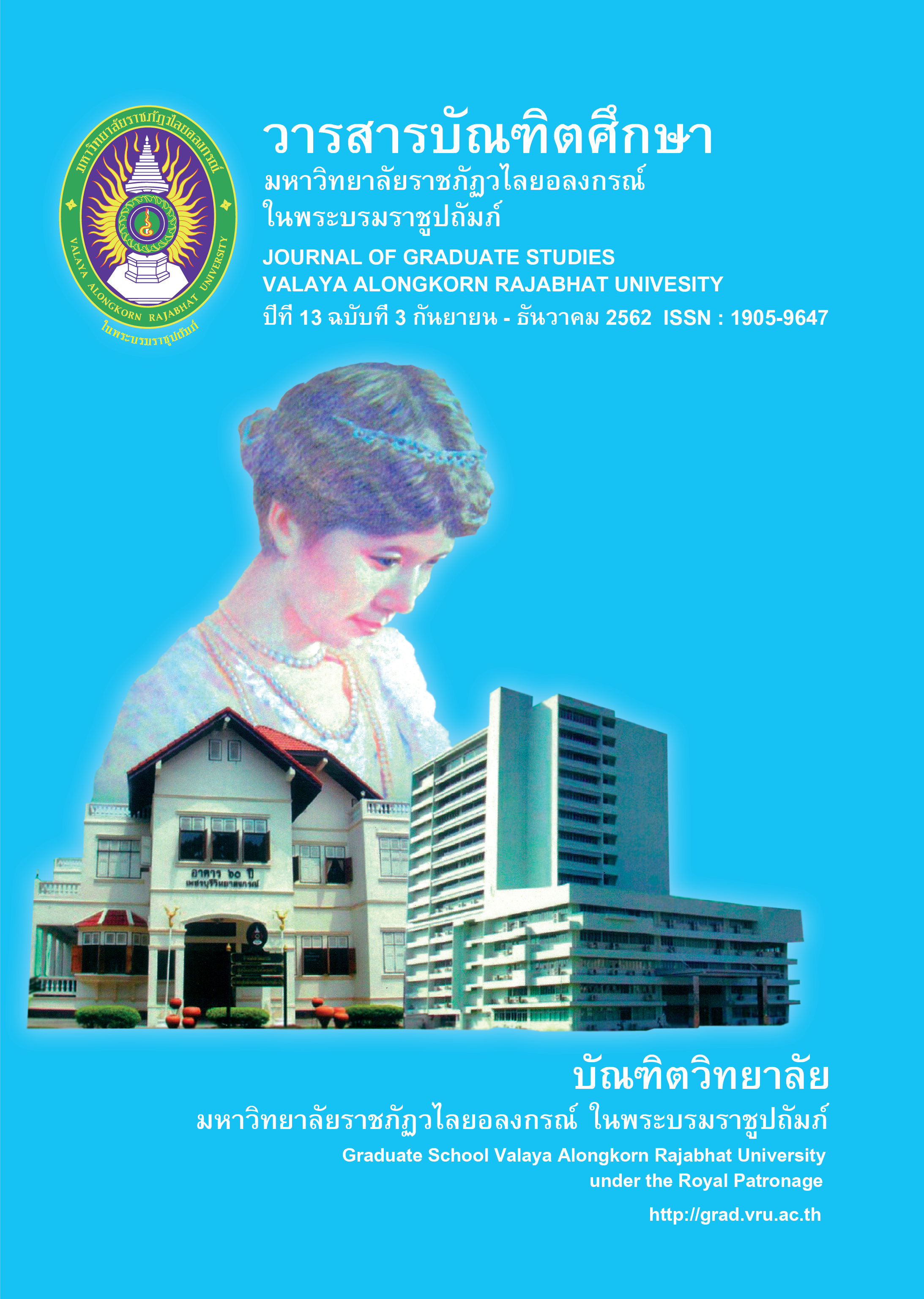THE STUDY OF COMPETENCIES OF SECONDARY SCHOOL PRINCIPALS IN 21st CENTURY
Main Article Content
Abstract
This study aims to develop a 21st century executive performance indicator and to examine the consistency of the 21st-century executive performance indicator model of high school developed with empirical data. There are two stages in the process of research: Step 1 Modeling of the theoretical indicators of 21st century management performance by documentary synthesis, gathering draft models of the theoretical indicators structure and in-depth interview 9 experts were used to formulate a theoretical model. The instrument were the interview questionnaire titled the 21st century executive performance indicators of secondary school principals; analyzing data by applying interview results to do data organizing, data displaying and interpretation, and conclusion, and then summarize it into a theoretical indicator structure model, and Step 2 Checking the consistency of the 21st century executive performance indicator model. The population were 933 secondary school principals Under the Office of Secondary Educational Service Area 19 – 33 in academic year 2017 and 500 of them were the samples selecting by Two-Stage Random Sampling. The instrument were created by using indicators and elements obtained from Step 1 to create a 5 – rating scale questionnaire and reliability value was .996 and data analysis using Computer Software.
The study findings were as follows: The competencies of secondary school principals in 21st century consisted of 6 core competencies and 23 functional competencies such as:1)Modern management core competency which has 3 functional competencies; Strategic change management, Empowerment of assigning decision responsibility and Using resources efficiency, 2) Team work core competency which has 5 functional competencies; Participative management, Cooperation, Accompany with assigning strategic and goal setting, Creating mutual trust and Communication, 3) Individual and organization development core competency which has 3 functional competencies; Emotional management, Self and personnel understanding and Ethics and virtue, 4) Innovation for development core competency which has 4 functional competencies; Creating innovation management, Using technology for management, Making organization of learning and Knowledge management, 5) Thinking development core competency which has 4 functional competencies; Creative thinking, Critical thinking, Analytical thinking and Systems thinking, 6) Academic leadership core competency which has 4 functional competencies; Curriculum development, Learning process development, Supervision in school and Student development and when the model is consistent. The chi-square test was statistically significant at 176.06, with no statistical significance, df = 153. Chi-Square is 0.15 GFI, 0.97 AGFI is 0.95 CFI, 1.00 SRMR is 0.02, RMSEA is 0.02, and CN is 552.38. It shows that the Equation of Equation Consistent with empirical data.
Article Details

This work is licensed under a Creative Commons Attribution-NonCommercial-NoDerivatives 4.0 International License.
บทความทุกเรื่องได้รับการตรวจความถูกต้องทางวิชาการโดยผู้ทรงคุณวุฒิ ทรรศนะและข้อคิดเห็นในบทความ Journal of Global of Perspectives in Humanities and Social Sciences (J-GPHSS) มิใช่เป็นทรรศนะและความคิดของผู้จัดทำจึงมิใช่ความรับผิดชอบของบัณฑิตวิทยาลัย มหาวิทยาลัยราชภัฏวไลยอลงกรณ์ ในพระบรมราชูปถัมภ์ กองบรรณาธิการไม่สงวนสิทธิ์การคัดลอก แต่ให้อ้างอิงแหล่งที่มา
References
Chadcham, S. (2004). kān wikhro̜ ʻongprakō̜p chœ̄ng yư̄nyan [Confirmation component analysis]. Journal of Educational Research and Measurement. Burapha University, 2(1), 15–42.
Hood, C., & Jackson, M. (1991). Administrative argument. Aldershot, Hants. England: Dartmouth.
Kanjanawasi, S. (2009). thritsadī kānthotsō̜p bǣp dangdœ̄m [Traditional test theory]. No. 6. Bangkok: Chulalongkorn University.
Khaengrang, N. (2017). kānphatthanā tūa bongchī samatthana khō̜ng phūbō̜rihān sathān sưksā sangkat samnakngān khana kammakān kānsưksā naphư̄n thān nai bō̜ribot prachākhom ʻĀsīan [Development of Performance Indicators of School Administrators under the Office of Basic Education Commission in the context of ASEAN Community], Journal of Nakhon Phanom University, 7(3), 27-35
Nopkesorn, T. (2006). withīkān wičhai chœ̄ng khunnaphāp lem sō̜ng [Qualitative research methods. Book 2]. Nakhon Ratchasima: Chok Charoen Marketing.
Office of the Education Council. (2015). khrōngkān patirūp kān rīanrū sū phū rīan (Phō̜.Sō̜. sō̜ngphanhārō̜ihāsipčhet - sō̜ngphanhārō̜ihoksip) sathō̜n panhā læ thāngʻō̜k tō̜p čhōt patirūp kānsưksā Thai [Learning reform program to learners (2014 - 2017) "Reflecting problems and solutions to meet Thai education reform"]. Bangkok: 21 Century Company Limited.
Phophet, W. (2013). kānphatthanā tūa bong chī phāwa phū nam thāng wichākān khō̜ng phūbō̜rihān sathān sưksā khan phư̄nthān [Development of academic leadership indicators of school administrators Basic]. Net Journal Review Siam University, 27(84), 7-27.
Phunsungka, R. (2012). kānphatthanā tūa bongchī samatthana phūbō̜rihān sathān sưksākhan phư̄nthān [Development of performance indicators for basic school Administrators]. Doctor of Philosophy Thesis Faculty of Management Studies Udon Thani Rajabhat University.
Reeves, D. B. (2011). Finding your leadership focus. NewYork: Columbia University.
Sanraratana, V. (2013). krabūan that mai thāngkān sưksā : kō̜ranī thatsana tō̜ kānsưksā satawat thī yīsipʻet [New paradigm of education: the case of attitudes towards 21st century education]. Bangkok: Thippawisut.
Singthong, P. (2015). kānphatthanā tūa bongchī samatthana khrū nai satawat thī yīsipʻet sangkat samnakngān khēt phư̄nthī kānsưksā prathom sưksā nai phāk awanʻō̜k chīang nư̄a [Development of teacher performance indicators in the 21st century under the office Primary education area in the northeastern region]. Doctor of Philosophy Thesis Faculty of Management Studies Loei Rajabhat University.
Sutawong, S. (2010). kānphatthanā tūa bongchī samatthana kānbō̜rihān wichākān khō̜ng phūbō̜rihān sathān sưksā radap matthayommasưksā sangkat ʻongkō̜n pokkhrō̜ng sūan thō̜ngthin [Development of academic administration performance indicators of secondary school administrators Under the local government organization]. Journal of Education Naresuan University, 3(13), 21-41.
Teacher Development Institute, Faculty and Educational Personnel. (2008). hrōngkān phatthanā samatthana khō̜ng khrū tām rabop kānphatthanā khrū læ bukkhalākō̜n thāngkān sưksā [Teacher competency development program according to teacher development system and educational personnel]. Bangkok: Ministry of Education.
Thompson, Arthur A., Jr, & A. J. (2003). Strickland III. Strategic Management: concepts and Cases. 13thed. New York: McGraw Hill/Irwin.
Wongvanich, S. (2015). kānwičhai pramœ̄n khwāmtō̜ngkān čhampen [Research needs assessment]. 3rd edition, Bangkok: Chulalongkorn University.


